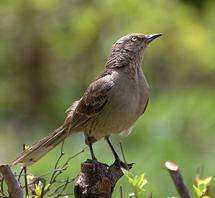'Alien' eggs benefit mockingbirds

(PhysOrg.com) -- Mockingbirds rarely remove the ‘alien’ eggs parasitic cowbirds lay in their nests because keeping them dilutes the risk of their own eggs being attacked.
The study, by Oxford University and Argentinean scientists, examined the behavior of the chalk-browed mockingbird (Mimus saturninus) which is parasitized by the shiny cowbird (Molothrus bonariensis) in Argentina.
A report of the research is published in this week’s Proceedings of the Royal Society B.
Shiny cowbirds regularly visit mockingbird nests and attack and puncture any eggs they find there – damaged eggs are later removed by the mockingbird host. During these visits cowbirds will often lay their own eggs in the nest for mockingbirds to hatch and bring up alongside their own chicks.
Whilst mockingbirds will mob an attacking cowbird, once an alien egg has been laid in their nest they will usually accept it – even though it looks very different from their own eggs.
The researchers recorded video of 130 cowbird visits to see what happened to the eggs in mockingbird nests over three breeding seasons. They experimentally manipulated clutch compositions to compare host egg survival in clutches with different numbers of cowbird eggs. They found that mockingbird eggs were more likely to survive a puncture attack when more cowbird eggs were present in the nest.
Computer simulations showed that this is likely to be a widespread phenomenon, and that, paradoxically, the greater the local density of parasites, the stronger the benefit hosts get from the presence of parasite eggs.
"It seems that the advantage mockingbirds gain from leaving these alien eggs in their nests is that they attract some of the destructive behaviour in later cowbird visits, and this benefit outweighs the cost of later having to rear the cowbird nestlings," said Professor Alex Kacelnik from Oxford University’s Department of Zoology, an author of the report. "This is likely to be because, unlike other parasitic birds such as the cuckoo, mockingbird chicks do well in competition with their parasitic nest-mates – fledging at rates similar to those of unparasitized broods."
Of 347 mockingbird nests studied 89% were parasitized with one or more cowbird eggs, 35% receiving more than three, and 16% more than five (typically, they received around three).
"It might be expected that this high rate of parasitism would encourage a host to evolve more effective anti-parasite defences," said Ros Gloag from Oxford University’s Department of Zoology, an author of the report. "In fact, the opposite is probably true: the higher the intensity of parasitism, the higher the frequency of puncturing attacks and the greater the importance of diluting this risk. Thus, hosts benefit more by not rejecting parasite eggs when there are more parasites around."
More information: A report of the research, by Ros Gloag and Alex Kacelnik of Oxford University, and Vanina Fiorini and Juan Reboreda of the Universidad de Buenos Aires (Argentina), entitled ‘Brood parasite eggs enhance survivorship in a multiply parasitized host’ is published in Proceedings of the Royal Society B.
Journal information: Proceedings of the Royal Society B
Provided by Oxford University



















